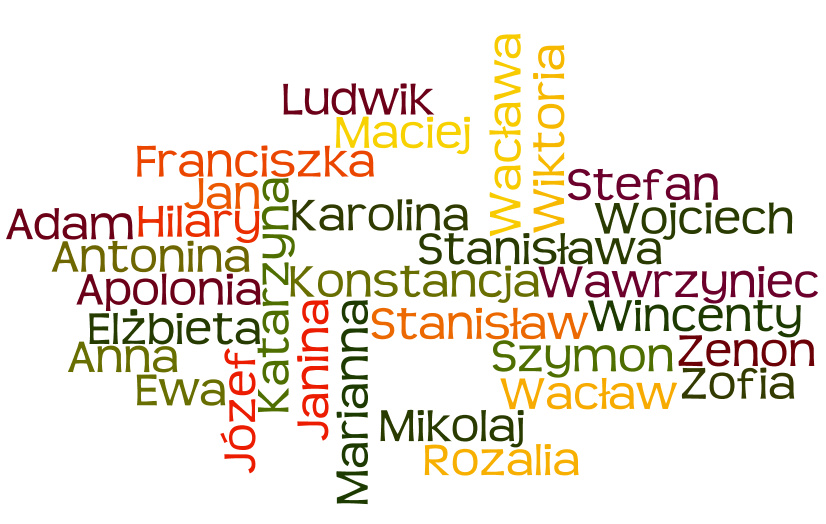Decoding Confusing Last Names: Origins, Challenges & Solutions
Ever wondered why some last names seem to trip off the tongue, while others require a moment of careful consideration? It's a question that sparks curiosity and often unveils fascinating stories. The truth is, behind every complex or confusing surname lies a rich history, a tapestry woven from threads of culture, migration, and the simple passage of time.
Family names, or surnames, are far more than mere labels; they are integral threads in the fabric of personal identity. They connect us to our ancestors, offering clues to our origins and cultural heritage. However, the very nature of surnames means they can be subject to change, evolution, and a dash of bewilderment for the uninitiated. Unique spellings, challenging pronunciations, and historical transformations all contribute to the fascinating, and sometimes frustrating, world of confusing last names. Understanding the origins and meanings behind these names, and the challenges they present, can be a rewarding experience. Whether you are a genealogist, a linguistic enthusiast, or simply a curious individual with a desire to know more about your roots, this exploration of confusing last names can offer insights into a complex and fascinating area.
Let's delve into the details of how confusing surnames come about, and discover ways to unravel their mysteries. The journey will explore the many threads of culture, history, language and society that together give us the modern surname. It will examine how the past continues to shape the present in this most personal of areas.
- Discover Sone 260 Your Digital Transformation Starts Now
- Splashland Your Ultimate Water Park Adventure Awaits
In this article, we will explore the intricacies surrounding confusing last names, and offer you practical solutions to help you navigate them effectively.
| Area | Details | Notes |
|---|---|---|
| Name in Question: | Confusing Last Names | A broad category encompassing surnames with spelling, pronunciation, or historical ambiguities. |
| Origins: | Linguistic, Cultural, Historical | These factors combine to create the varied landscape of surnames. |
| Examples of Origins: | Occupations, Locations, Patronymics | "Smith" (blacksmith), "Hill" (living near a hill), "Johansson" (son of Johan) |
| Common Challenges: | Spelling Variations, Pronunciation Difficulties, Historical Transformations | The practical problems associated with confusing surnames. |
| Cultural Influences: | Varying Naming Traditions | Asian cultures (family name first), Hispanic cultures (dual surnames). |
| Tips for Research: | Genealogical Databases, Historical Records, Genealogical Communities | Tools for investigating confusing surnames. |
| Legal Considerations: | Name Change Procedures | Varying by jurisdiction; impact on official documents. |
| Practical Solutions: | Consistent Naming Practices, Technology for Name Management | How to manage and navigate confusing surnames in the modern world. |
| Key Takeaway: | Rich histories and cultural diversity | Understanding surnames enriches knowledge and understanding of global identities. |
| Reference: | Wikipedia - Surname | For further reading. |
The genesis of confusing last names is a complex one, rooted in the evolution of how people have identified themselves throughout history. Initially, many societies functioned perfectly well with single names. As populations grew, however, the need for more precise identifiers became apparent. This led to the development of surnames, which were often derived from a range of sources, reflecting different aspects of life at the time.
One significant source was the individual's occupation. The surname "Smith," for example, is a direct derivative of the occupation of blacksmithing, a trade that was essential to many societies. Similarly, the name "Miller" identified someone who worked in a mill, grinding grain. These occupational surnames are a direct link to the working lives of our ancestors. Locational names are another common source of surnames, describing where a person lived or came from. "Hill" indicated residence near a hill, while "Brooks" denoted someone who lived near a brook or stream. These names provide a geographical link, adding another layer of information about a person's background. Patronymic surnames, which indicated a person's parentage, were also frequently used, especially in some areas such as Scandinavia. "Johansson" (son of Johan) and "MacDonald" (son of Donald) are excellent examples.
- Explore Sexy Film Full Hd Art Tech Amp Responsibility
- Mefan Fox Erome Unveiling The Digital Star Trends
In addition to these origins, several factors contribute to the confusion we often experience with modern surnames. Language barriers play a significant role. Names translated or transliterated between different languages can lead to unfamiliar spellings or pronunciations. An example could be the translation of a German surname to a different language, which would modify the spelling. Migration patterns also had a large impact. Immigrants who moved to new countries often modified their names to conform to the linguistic norms of their new homes, resulting in changes to spelling or pronunciation to ease assimilation. Furthermore, historical records are not always perfect, and administrative errors, clerical mistakes, or incomplete documentation can also contribute to variations and inaccuracies.
Cultural influences are also highly significant. Different societies have unique naming traditions, reflecting their individual histories, values, and social structures. In some Asian cultures, family names precede given names. This practice emphasizes the importance of lineage and ancestry, highlighting the cultural significance of the family name. In Hispanic cultures, it's common for individuals to carry dual surnames, combining their paternal and maternal family names. This practice reflects the importance of the extended family and preserves the heritage of both parents, giving both surnames equal weight.
It is also important to consider spelling variations, which are a common source of confusion. These variations can arise from phonetic transcription, which occurs when a name is written based on its sound, rather than its original spelling. Regional dialects can also affect spelling. The dialect spoken in one part of a country may pronounce a name differently from another, causing variations in spelling. Historical changes in language also play a significant role. As languages evolve over time, the spelling of certain names may also shift. For example, the surname "Johnson" has various spellings, including "Johnston," "Jonsson," and "Johansson," all variations on a similar theme.
Pronunciation challenges also often arise. Pronunciation can vary considerably depending on the language or dialect in which a name is spoken. For instance, the French surname "Dupont" is pronounced in a way that is very different in French and English. These differences can easily lead to misunderstandings or misinterpretations of last names. In some languages, specific phonetic rules may affect the pronunciation of particular names. To improve pronunciation, one can use language-specific resources for guidance, listen to native speakers, and practice speaking aloud to improve accuracy and confidence. This also helps when dealing with names which include letters that do not easily translate into a different language.
Historical transformations are another critical factor, and these transformations can often be linked to political, social, and economic changes. In the colonial period, for example, many indigenous names were replaced with European surnames, erasing cultural identities and traditions. This had a profound effect on the names and identities of entire populations. Name changes were also often motivated by assimilation efforts or personal preferences. Immigrants arriving in new countries might adopt Anglicized versions of their original names to blend into their surroundings or simplify communication. This could reflect a desire to integrate into a new society. A result of these many transformations is the sometimes confusing array of surnames we see today.
Conducting research into confusing last names requires a systematic approach and the use of reliable resources. Online genealogical databases such as Ancestry.com or FamilySearch.org can be invaluable in tracing family histories. These databases provide access to extensive records and can help researchers piece together family trees. Historical records, including census data, immigration documents, and birth certificates, are essential for gathering accurate information. These records provide concrete evidence of names, dates, and places. Engaging with genealogical communities or forums allows researchers to share their findings and collaborate with others. This can lead to new discoveries and insights.
Last names play a very important role in genealogical research, acting as vital clues in tracing family lineages and ancestral connections. They provide a link to previous generations, offering glimpses into their lives, occupations, and geographical origins. Surnames also act as a starting point for exploration. By analyzing name patterns and variations, researchers can piece together family trees and establish relationships between distant relatives. Identifying patterns in surnames and their distribution across different regions can shed light on migration patterns and historical events. In essence, last names are a fundamental part of understanding family heritage and tracing our roots.
When considering the legal aspects of last name changes, it's important to know that the procedures for changing a last name vary by jurisdiction. Individuals may choose to change their names for a wide range of reasons, including personal, professional, or cultural considerations. In most cases, this involves submitting legal paperwork to a court or government authority, along with a justification for the change. The process generally involves the submission of an application, supporting documentation, and payment of fees. It's important to note that a name change will also affect official documents such as passports, driver's licenses, and property titles, meaning the records must be updated to reflect the new name.
So, what are the best ways to manage confusing last names? One of the simplest ways is to adopt consistent naming practices. This might involve retaining traditional names while incorporating phonetic spellings for ease of use. Another solution is the use of technological tools. Name verification software and automated transcription systems can help standardize spellings and ensure accuracy across various platforms. For example, when a surname is often misspelled, using software can help ensure a consistent spelling of the name throughout documents.
Confusing last names are both a challenge and an opportunity for discovery. By understanding their origins, cultural influences, and historical transformations, we gain a deeper appreciation for the rich tapestry of identities they represent. Whether you're conducting genealogical research, navigating legal processes, or simply curious about your family history, understanding these factors provides the tools and insights needed to tackle these complexities. Sharing your experiences and perspectives can contribute to a greater understanding of this fascinating subject, so it is worth sharing your insights on any particularly perplexing last names you have researched. The more we share, the more we can understand the patterns and origins of our names.


Detail Author:
- Name : Cristian Borer
- Username : norberto77
- Email : hane.beau@konopelski.com
- Birthdate : 1979-10-27
- Address : 21337 Orlo Bridge Denesikview, LA 37227
- Phone : 1-845-958-3109
- Company : Roob Ltd
- Job : Clerk
- Bio : Quae est non similique voluptas culpa cupiditate quia. Reiciendis reiciendis facilis odio nulla impedit rem. Deserunt iusto id enim nihil eos.
Socials
linkedin:
- url : https://linkedin.com/in/gage.muller
- username : gage.muller
- bio : Iste nihil qui nihil ut.
- followers : 6609
- following : 1782
twitter:
- url : https://twitter.com/gage_xx
- username : gage_xx
- bio : Ab quia adipisci assumenda. Nam dolores officia recusandae aut maiores distinctio.
- followers : 4867
- following : 2465
instagram:
- url : https://instagram.com/gmuller
- username : gmuller
- bio : Voluptatem quo ad molestiae quo. Cumque sed eaque incidunt.
- followers : 5784
- following : 1454